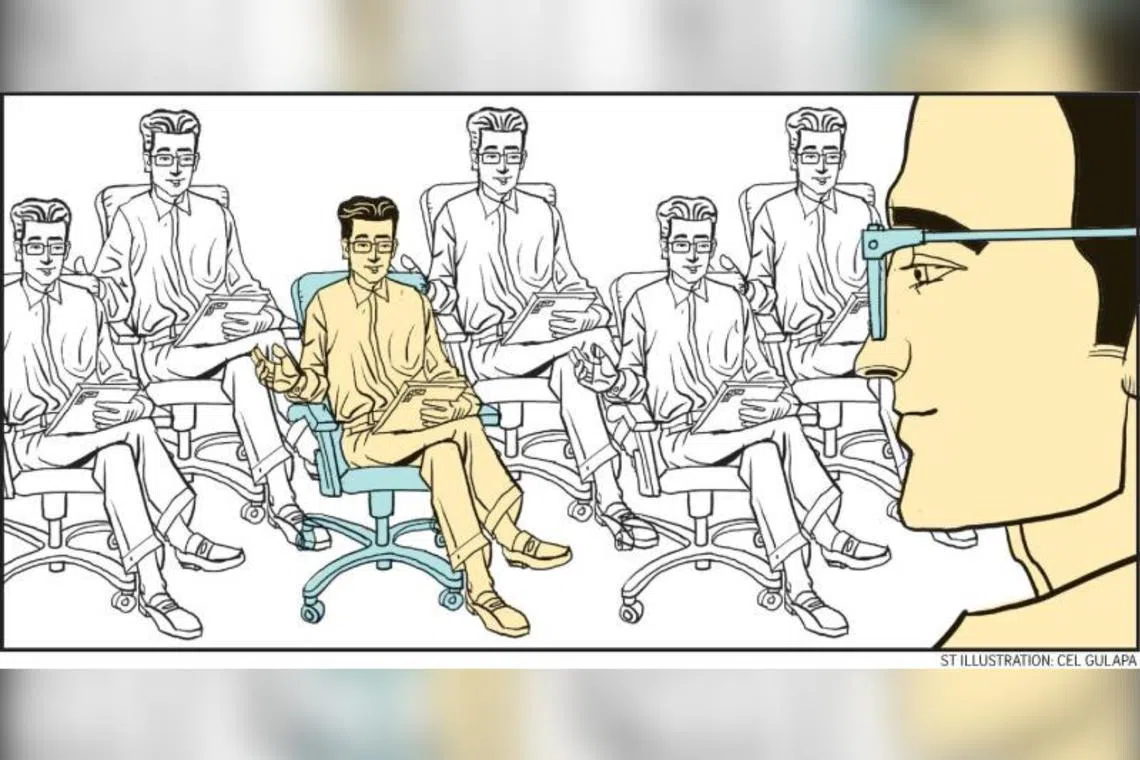askST Jobs: How to shine in group interviews
Sign up now: Get tips on how to grow your career and money

Candidates can succeed in group interviews by striking a balance between contributing meaningfully and allowing others to participate.
ST ILLUSTRATION: CEL GULAPA
Manpower reporter Tay Hong Yi offers practical answers to candid questions on navigating workplace challenges and getting ahead in your career. Get more tips by signing up to The Straits Times’ HeadSTart newsletter
Q: How can I stand out in group interviews?
A: Organisations usually conduct group interviews when they are hiring for several similar openings at once and want to assess multiple candidates simultaneously, says Mr David Blasco, country director at recruitment firm Randstad Singapore.
“Group interviews also offer employers the unique opportunity to evaluate applicants’ interpersonal dynamics and teamwork skills, beyond their personal strengths.”
Employers typically look for traits such as leadership, emotional intelligence and teamwork during group interviews, Mr Blasco says.
“They aim to discover whether candidates are able to work well with others and how they manage diverse perspectives, and are looking for individuals who can work well with others while still standing out for their achievements.”
He notes that a typical group interview usually involves four to eight candidates, and can be facilitated by a panel of interviewers or just one interviewer.
The interview is structured to include group activities where candidates must work together to solve problems and complete tasks, which can range from case studies and group presentations, to team-based debates or challenges.
Interviews tend to take place in a controlled environment such as a boardroom, or a closed space like a hotel business room, to ensure that candidates are not receiving external help.
Group interviews are more commonly seen in sectors that focus heavily on teamwork, effective communication, customer service or stakeholder relationship management. These include industries such as retail, hospitality and sales, where employees engage with customers in dynamic environments, Mr Blasco notes.
“Companies working on large projects, such as regional conferences or events, may also conduct group interviews as part of their bulk hiring exercises.”
Group interviews are typically conducted as a primary screening, where qualified talent are shortlisted for one-on-one interviews later, he adds.
Mr Blasco also says that prospective employers look out for different things in a group interview than from one conducted individually: “Rather than looking for talent with all the answers, employers are trying to assess how individuals respond and adapt to different situations.
“Candidates should research their panel of interviewers to understand whom they can expect to speak to, and prepare themselves for the potential topics of discussion by researching (employer review portal) Glassdoor or online forums.”
However, he warns candidates against asking a prospective employer who their fellow applicants in the group interview are, due to data privacy concerns.
Mr Blasco says candidates can succeed in group interviews by striking a balance between contributing meaningfully and allowing others to participate.
Those who excel in group interviews actively engage in discussions, listen to what fellow candidates share, take these views into account, and support the group towards achieving shared goals.
“A successful candidate fosters an inclusive environment, demonstrating leadership while also giving others the space to contribute, striking a balance between individual value and teamwork,” says Mr Blasco.
This means dominating the conversation would be frowned upon by employers, as it can indicate an unwillingness to share the stage or accept different perspectives, he adds, noting: “Monopolising the conversation can come across as aggressive or uncooperative.”
Have a question? Send it to askst@sph.com.sg



